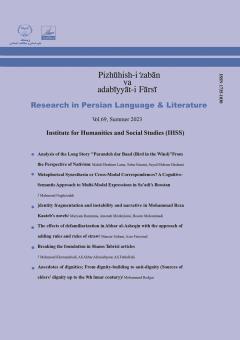The effects of defamiliarization in Abhar al-Asheqin with the approach of adding rules and rules of straw
Subject Areas : پژوهشهای ادبیات کلاسیک ایران
Manzar Soltani
1
*
![]() ,
Azar Firouzi Rad
2
,
Azar Firouzi Rad
2
![]()
1 - Associate Professor, Department of Persian Language and Literature, Khwarazmi University, Tehran, Iran.
2 - PhD student of Persian language and literature, Kharazmi University, Tehran, Iran.
Keywords: Abhar al-Asheqin, Rozbahan Baghli, De-familiarization, Straw Rule, Rule-enhancement.,
Abstract :
Part of the mysticism of the 6th century is the result of the thoughts of "Ruzbehan Baghli". In the book "Abhar al-Asheqin", Roozbahan Baghli has mixed dynamic thought with creativity with poetic expression in the form of prose and intertwined the boundaries between prose poetry and poetic prose. In the study of the language of "Abhar al-Asheqin" in this research, defamiliarization components were identified in his prose with an emphasis on the opinions of "leach".For this purpose, descriptive-analytical method and library resources have been used. In this book, Rozbahan's language has a special system, and the methods of defamiliarization, rule-making, and linguistic rule-enhancing, influenced by Rozbahan's mystical experiences, are well expressed. Grammarization through the process of verbal repetition is in the form of a balance resulting from lexical repetition, and among these, there is more incomplete phonetic repetition than complete phonetic repetition in the form of parallel (parallel and opposite) and congruent words. As a factor in creating defamiliarization in the form of personalization, simile, and metaphor, defamiliarization is the most frequent form of fantasy in "Abhar al-Asheqin" and the combinations of words that are mixed in an artistic and innovative way defamiliarize the language. The succession of additions and the use of verses and hadiths and contrasts are also among his tricks in this work.
احمدی، بابک (۱۳۸۰) حقیقت و زیبایی، تهران، مرکز.
---------- (۱۳۸۲) ساختار و تأویل متن، چاپ ششم، تهران، مرکز.
ارنست، کارل (۱۳۷۷) روزبهان بقلی، تهران، مرکز.
بزرگ بیگدلی، سعید و دیگران (۱۳۸۵) «بررسی سبک نثر شاعرانه در عبهر العاشقین»، پژوهش زبان و ادبیات فارسی، شماره ۶، بهار و تابستان، صص ۲۱- ۴۹.
بقلی شیرازی، روزبهان (۱۳۳۷) عبهر العاشقین، تهران، انستیتو ایران و فرانسه.
پورنامداریان، تقی (۱۳۷۴) سفر در مه، تأملی در شعر احمد شاملو، تهران، زمستان.
-------------- (۱۳۸۳) «بررسی جنبههای زیبایی شناختی معارف از دیدگاه (فرمالیستی)»، فصلنامه پژوهشهای ادبی، شماره ۴، تابستان، صص 59-۸۲.
تودوروف، تزوتان (۱۳۸۵) نظریه ادبیات متنهایی از فرمالیستهای روس، تهران، اختران.
حق¬شناس، علی¬محمد (۱۳۶۹) آواشناسی، چاپ دوم، تهران، آگاه.
سپنتا، ساسان (۱۳۷۷) آواشناسی فیزیکی زبان فارسی، اصفهان، گلها.
سلدن، رامان (۱۳۷۲) راهنمای نظریه ادبی معاصر، ترجمه عباس مخبر، تهران، طرح نو.
سید قاسم، لیلا (۱۳۹۶) بلاغت ساختارهای نحوی در تاریخ بیهقی، تهران، هرمس.
شفیعی کدکنی، محمدرضا (۱۳۷۶) موسیقی شعر، تهران، آگاه.
-------------------- (۱۳۹۲) زبان شعر در نثر صوفیه، تهران، سخن.
-------------------- (۱۳۹۶) رستاخیز کلمات، چاپ چهارم، تهران، سخن.
شیری، علی¬اکبر (۱۳۸۰) «نقش آشناییزدایی در آفرینش زبان ادبی»، آموزش زبان و ادب فارسی، شماره ۵۹، صص ۵۹-۷۱.
صفوی، کوروش (۱۳۹۴) از زبان¬شناسی به ادبیات، جلد ۱ و 2، تهران، سوره مهر.
علیپور، مصطفی (۱۳۷۸) ساختار زبان شعر امروز، تهران، فردوس.
غیاثالدین محمد (۱۳۳۷) غیاثاللغات، جلد ۲، به کوشش دبیرسیاقی، تهران، کانون معرفت.
فتوحی، محمود (۱۳۹۷) بلاغت تصویر، تهران، سخن.
قویمی، مهوش (۱۳۸۳) آوا و القا، تهران، هرمس.
متحدین، ژاله (۱۳۵۴) «تکرار، ارزش صوتی و بلاغی آن»، مجله دانشکده ادبیات و علوم انسانی مشهد، شماره ۳، صص 483-530.
مکاریک، ایرناریما (۱۳۹۰) دانشنامه نظریههای ادبی معاصر، ترجمه مهران مهاجر، محمد نبوی، چاپ چهارم، تهران، آگه.
موریس، جورج (۱۳۷۲) «آثار صوفیه در قرون وسطی به نثر فارسی»، ترجمه امیره ضمیری، فرهنگ، شماره ۴، بهار، صص ۲۱۰- ۲۴۶.

